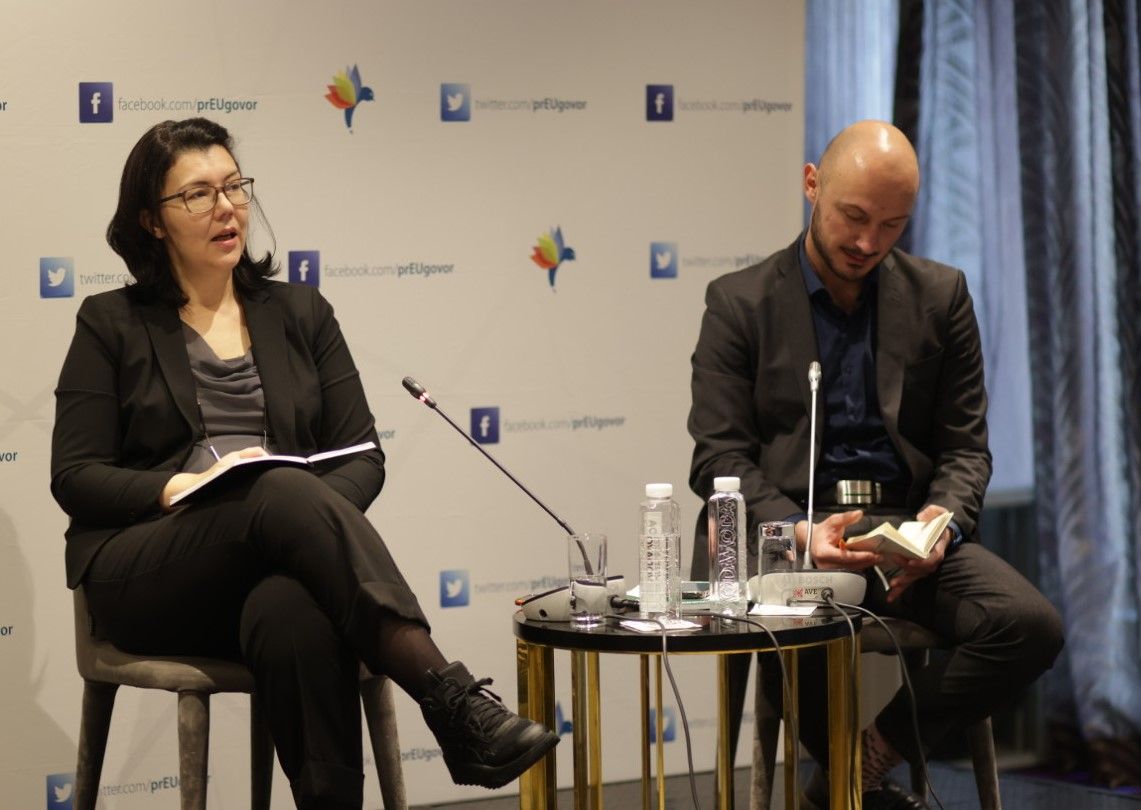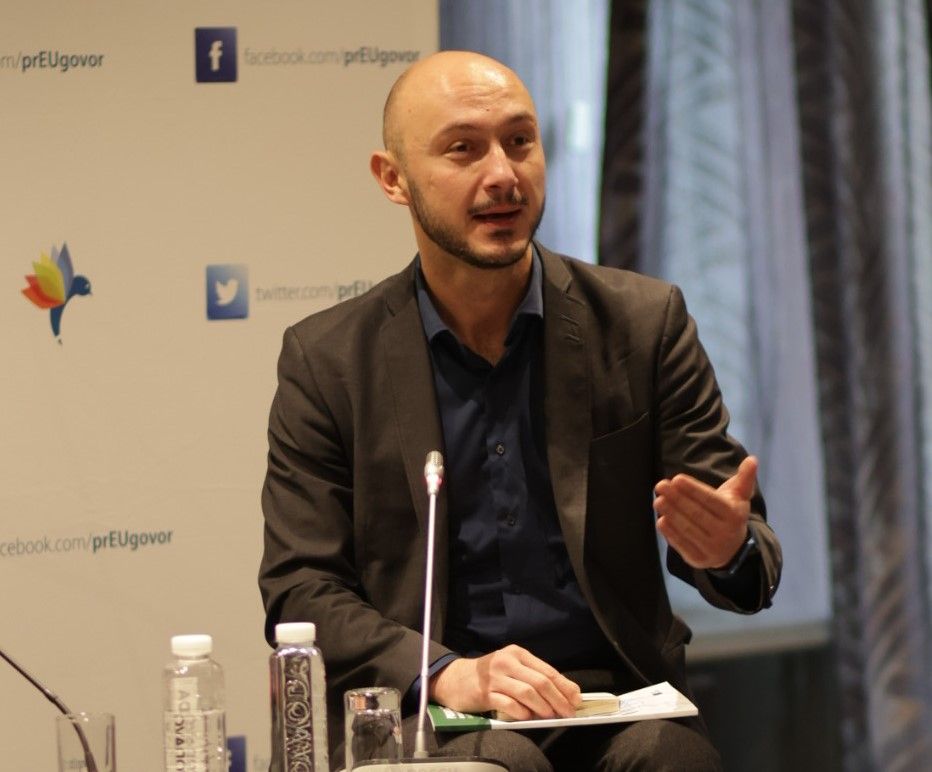The state’s response to the systemic problems manifested by the mass shootings of May 2023 was insufficient, the police has no director for two years now, the state administration is filled with individuals in illegal acting status, and there is no longer a dialogue on improving election conditions, and human trafficking is still a neglected topic – these are the conclusions from the presentation of the 21st prEUgovor Alarm report on November 22 at the Hotel "Metropol Palace" in Belgrade.
Nemanja Nenadić, program director of Transparency Serbia, Bojan Elek, deputy director of the Belgrade Centre for Security Policy (BCSP), and Jasmina Krunić, coordinator for public policies at ASTRA Anti-trafficking Action, participated in the presentation of the prEUgovor Alarm report. Jelena Pejić Nikić, senior researcher at BCSP and coordinator of the prEUgovor coalition, moderated the debate.
The moderator Jelena Pejić Nikić opened the conference, pointing out that the Report covers the period from March to October 2023 and that it is the most extensive report so far, with a total of 20 contributing authors. This period was marked by two mass murders in May, the traumatization of society by these events, and the protests that were sparked by it.
In Serbia, for every registered case of human trafficking, nine go unnoticed
When asked by the moderator about the consequences of the mass murders in Serbia at the beginning of May this year, Jasmina Krunić, ASTRA's public policy coordinator, answered that they brought the reality to the surface. The reaction of the competent institutions was to blame Western values for these events already at the press conference on 3 May 3. She pointed out that showing a list of children's names at this conference represented a gross violation of their right to privacy and that the effect was additionally exacerbated by the fact that this was one of the most watched press conferences ever in Serbia.
As for her impression of these events, she pointed out that in Serbia as a society “we show resistance to violence, instead of doing something against it”. Jasmina Krunić also pointed to problems in relation to the fight against human trafficking. She referred to the criticism that civil society organizations are too insistent on this topic, stating that according to the estimates of international organizations, for every identified victim of human trafficking in Serbia, as many as nine go unnoticed. She also said that the need for an intersectoral response from institutions arises from the complexity of this problem and the trauma that the victims are forced to go through.
While state representatives claim that there are no funds for victims, and the state does not finance the services provided to victims by civil society organizations, journalists have once again discovered abuses in the distribution of budget funds. Namely, funds intended for vulnerable groups were received by phantom organizations that falsified their reports, to the detriment of end users.
The police have no director for two years, and the Ministry of Interior is in acting status
Bojan Elek, deputy director of the Belgrade Centre for Security Policy, pointed out that the police were one of the institutions that was most affected by the events of May. He said that these incidents, and then the elections scheduled for December, suspended the consultations of the Ministry of Interior with civil society organizations on the Draft Law on Internal Affairs and that, as a result, some of the key issues remained unresolved.
Commenting on the state's reaction to the tragic events, Elek pointed out that the campaign to surrender illegally owned weapons was forty times more successful than previous campaigns after 2015. On this issue BCSP is preparing a special report, which will be presented in early December, he announced. Commenting on other state measures, he pointed out that the deployment of police officers in schools in the period after the tragedy reassured parents, but also that researchers from the United States found that this does not increase security or the feeling of security in schools in the long run.
Bojan Elek also referred to problems in the police, among which he particularly pointed out that the police have not had a director for two years, as well as that the heads of all sectors in the Ministry of Interior are in the acting status. There is a chronic deficiency since, according to Elek, the police had only two directors since 2006.
This situation is particularly controversial from the aspect of the operational autonomy of the police, which implies preventing the exercise of political influence on the police. Apart from the problem of head officials in acting status, Elek points to the transfer of managers from the Security Information Agency (BIA) to the police, which, as he states, is making the police captured.
The outgoing government illegally appointed 70% of acting officials in state administration
Commenting on the reaction of the National Assembly to the mass murders in May, Nemanja Nenadić, program director of Transparency Serbia, said that this institution missed the opportunity to have a positive impact in the previous period. He pointed out that, for instance, the Assembly should have adopted an amendment to the law that would serve as a legal basis for the weapons collection campaign, instead of basing this action on the minister's orders. He also referred to the inquiry committee, which was dissolved in a legally dubious manner even before it actually started working.
Nenadić reminded that 60 items on the agenda of the last parliamentary session underwent a joint debate. Many of the proposed laws contained high corruption risks, and there was no time to discuss them. In this context, he cited an example of the law dealing with the specialized exhibition “EXPO 2027".
Nenadić added that during its one-year mandate, the Government illegally appointed as many as 70% of acting officials in the state administration and that they are illegally performing their duties. As a result, they respond particularly easily to any political “hint” that could help in the election campaign.
The elections will cost close to 10 million euros, and the election conditions have not improved
Speaking about the election conditions, Nenadić stressed that there are huge differences between this year's and previous elections. He pointed out that there were attempts earlier to at least organize the dialogue and that there was some engagement of representatives of the European Union, while today the dialogue is practically not even conducted.
Whenever certain changes were made, it was on issues that the ruling and opposition parties agreed upon, such as, for example, changing the quotas for the allocation of budget money that the parties receive for campaigning. On the other hand, the problems of campaign financing, misuse of public resources, and public officials’ campaigns remain unresolved.
The only exception is what was done in the Law on Electronic Media, but even that measure is pointless, Nenadić said. He explained that a ban was introduced for some media, television, and radio stations to transmit information about some activities of some officials, only those who are candidates in the elections, and only for a certain period. Now that „quasi-ban“ has been extended from 10 to 30 days, although ODIHR's recommendation was to extend it to the entire election campaign. Nenadić added that the ban will not apply to the president of the republic at all because he is not a candidate in the elections, nor to the presidents of Belgrade municipalities if they are not candidates for city councilors.
Speaking about how much the new elections will cost the citizens of Serbia, Nenadić said that each party will receive campaign money from the budget, which is slightly less than 10 million euros.
“There are many other costs, and most of them are hidden. Every election campaign costs a lot, people in power spend a lot of money during that period on things that would bring them popularity. It was assistance for pensioners now, previously for young people, money for social and development programs, although it might not be a priority if there were no elections“, says Nenadić.
The conference is fully available HERE in Serbian.
This conference was organised with the support of the European Endowment for Democracy (EED) and funded by the European Union. Its contents do not necessarily reflect the official opinion of EED or the EU. Responsibility for the information and views expressed at the conference lies entirely with the coalition prEUgovor.
The report from the conference was written by BCSP intern Nikola Vlajnić.






